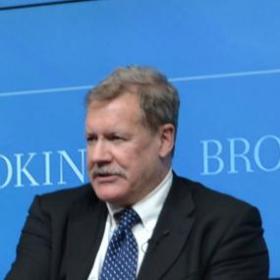
Anticipating Economic Shock: Who Rules the World?
In his weekly column in New Europe, Greg Austin discusses the challenges of global economic security and how it is connected to and affected by other major global challenges like climate security.
The inadequacy of current global institutions is widely recognized. The challenge is neatly summarized in a unique joint assessment by the United States National Intelligence Council and the European Union’s official Security Studies Institute. They concluded in October 2010: “The growing number of issues on the international agenda, and their complexity, is outpacing the ability of international organizations and national governments to cope.” The report went to note that “threats such as ethnic conflicts, infectious diseases, and terrorism as well as a new generation of global challenges including climate change, energy security, food and water scarcity, international migration flows, and new technologies are increasingly taking center stage”.
The report concluded that global governance institutions needed “extensive institutional reforms and innovations” if we are to handle the new challenges.
In the last month, President Obama reminded us of the large unfinished agenda for reform of global institutions from the 2005 Millennium Review Summit convened by the United Nations when he backed India’s bid for a permanent seat on the UN Security Council.
But it is preparing for and responding to global economic shock, not the normal agenda of the Security Council, that deserves highest priority for innovation of global institutions. On 5 October 2010, the Food and Agriculture Organization published a report which noted, among other important conclusions, the mismatch between international development assistance and the needs for many countries to rely on agriculture as the foundation of their capacity to respond to economic shock. It concluded: “Agriculture accounts for a third of protracted crisis countries’ gross domestic product and two thirds of their employment. Yet agriculture accounts for only 4 percent of humanitarian ODA received by countries in protracted crisis and 3 percent of development ODA.”
In 2008, the World Food Program developed an Economic Shock and Hunger Index (ESHI) to better understand which countries are likely to become more vulnerable to food insecurity due to economic shock of the sort created by steep increases in oil prices before and during 2008.
The impacts of economic shock are diverse. For example, according to a 2001 World Bank study, the death rate among Russian working age men “increased by over 70 percent between 1990 and 1994 coincident with the introduction of market reforms”. More recently, one study notes that the global financial crisis of 2009 hit labour markets in OECD countries “more rapidly and severely than initially thought”. In particular, it “hit immigrants and their families particularly hard, threatening most of the progress accomplished in recent years in terms of labour market outcomes … for integration of immigrants and social cohesion.”
Most governments and observers no longer see this sort of domestic effect as an entirely domestic matter. There is growing interest in a coordinated global response both to the causes of economic shock and its effects. There is increasing intolerance for the large-scale disruption to human security that these shocks cause.
The global community does have some limited mechanisms responding to humanitarian crises caused by economic shock through provision of emergency relief in cases of starvation, famine or large scale natural disaster. The international community has not developed a systematic and comprehensive approach to dealing with the heavy human costs of economic shock, nor does it have the institutions to do so. Most countries pay little attention to the sum total of effects of economic shock beyond their own borders. There is no coherent approach to “anticipating” the security effects of global economic shock. Even the 2005 Millennium Review Summit did not specifically address this specific slice of economic security.
Who will do this? Who will govern the globe to protect against the recurrent threat of large scale economic shock?

